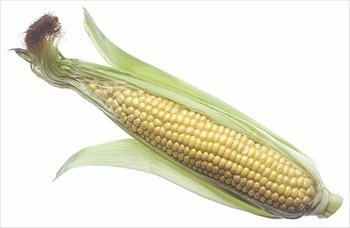
TOWZER'S EAR OF CORN.
THE farmer had just closed and locked the door of his granary, when some one pulled at his sleeve, and, looking down, he saw a small boy holding an ear of corn.
"I found it in your field, and I guess it fell off from a load; so I brought it to you."
"Why didn't you keep it?" asked the farmer, looking sharply at his companion.
"Because it didn't belong to me."
"But it is only one ear; I should never miss it. It wasn't worth while to bring it."
"Mother says it is always worth while to be honest, and I never stole as much as a pin in all my life. I wouldn't do it, either. I learned the commandments when I was a little bit of a fellow; so I know better."
"I am glad of that. Now, what would you do with that ear of corn if it was yours?"
"Plant it next year, if I had any place, and then, perhaps, I should get a good many; then, if I kept on planting every year, after a while I should have a whole barnful of ears."
"So you would. That is pretty good calculating.
What is your name? When I talk with a boy, I want to know what to call him."
"My name is Thomas Ayer, but you can call me Towzer; that is what everybody used to call me where we came from, because, you see, my hair is always all towzed up. It is so curly it won't keep straight; and, besides, my comb is an awful poor one."
"You look as though you belonged to an awful poor' family."
"I do, but we are going to be better off some time. Father's hands are all drawn up, so he can't do much; and that makes him discouraged, and mother too. But I am the oldest of the children, and I am going to work. If I can only get a start, I can keep right steady at it."
"That is true, Towzer; and I will give you that ear of corn, with land enough to plant it next year.
What do you think of that for a start?"
"I think that is a good deal better than I expected. I thank you ever and ever so much."
"All right! I guess I can afford it. You can go into the house, and maybe the woman in there will give you some milk to carry home."
"Will she let me do some work to pay for it?
And please, sir, will you let me pay for this ear of corn too?"
"How long are you willing to work for it?"
"As long as you want me to."
"I guess it won't take a great while. But there are 'most always chores to do, and I guess we can keep you busy for an hour or two."
So Towzer was set to bring in wood and rake up leaves in the front yard, working busily until called to receive his wages. When he started for home, he carried not only an ear of corn, but a pail of milk and a bag of potatoes—the pail and bag to be returned the next day. As he trudged along, he found his burden somewhat heavy, but the thought that he had fairly started in a life of independence gave him courage.
His parents were poor and discouraged, yet there were some merry shouts in the house that evening; and the next morning, when 'he started to return pail and bag, his mother bade him a cheerful "God bless you!" His father was not a drunkard, and that was something for which to be thankful.
"Better have crooked fingers than drink whisky," said Towzer to his new friend when they were talking together. "It has been real hard for us to get a living; but father and mother looked hippy last night, and we are going to be better off some time."
"I believe you will," was replied. "If you do the best you can, you will come out all right."
All through the autumn and winter Towzer worked as he had opportunity. In the spring he shelled his ear of corn, saving the large, full kernels for seed, and feeding the rest to his pet chicken. He calculated the exact number of hills he could plant. A piece of ground was measured off for him, and this he managed to enrich without spending any money or accepting anything in charity. Never was a garden more carefully hoed and seeded, and seldom are work and care so well rewarded, while Towzer made sure that he paid full rent for the land occupied.
The experiment was repeated the second year with like encouraging results, and thus Towzer was started in life. Of course, so industrious and conscientious a boy was no laggard in school, and people learned to respect him for his intelligence no less than for his goodness and energy.
He is still called Towzer by those who know him best, although he is now the owner of broad acres and well-tilled fields. Every year he gives to some poor boy the same offer, which was made to him when he carried to its owner the ear of corn left from the, harvest, and many have profited by his kindness. With courage, industry, honesty, and trust in God, even an ear of corn may prove the foundation of a fortune.
Who of my readers are so poor that they cannot command as much as this?
—Mary Dwinell Chellis.